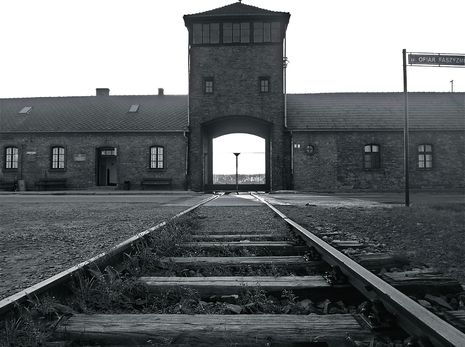The Zone of Interest is about more than just the Holocaust
It’s about everything we think, feel, and know about the Holocaust

Why do we make films about the Holocaust? By their very nature, Holocaust films must face and answer that question. After all, these films make money. They profit from depicting one of the greatest tragedies in human history, which, on the surface, is morally absurd. So, behind every Holocaust film, there must be a moral outcry — a way of saying “this is why you should see this, this is why it’s important, and this is how you should remember.”
“What these films share is their intent to elicit profoundly human emotions”
A grand and poignant epic like Schindler’s List serves as a message of hope and humanity in the face of immeasurable cruelty, a comment on the will of the human spirit to survive. A gripping and intimate arthouse thriller like Son of Saul is a harrowing testament to the abhorrent individual impact of the Holocaust. The essential documentary Shoah accumulates the experiences of hundreds of Holocaust survivors, offering an astonishing impression of the genocide’s impact on the worldwide public consciousness. What these films share is their intent to elicit profoundly human emotions that tap into a common understanding of the Holocaust — grief, shame, disbelief, terror. But Jonathan Glazer’s The Zone of Interest is provocative in a way never before encountered in Holocaust cinema. This staggering new contribution to the genre provokes an emotion that underpins everything we feel about the Holocaust and is arguably the only emotion truly worth inducing when considering pure evil: unbridled rage.
The brutality of The Zone of Interest, Glazer’s first film in ten years, takes shape not through any explicit portrayal of cruelty, but through the very absence of violence. The film opens on a black screen, accompanied by Mica Levi’s terrifying, guttural score of orchestral screams, belches, and tortured whines. The screen remains blank for just ten minutes but it feels eternal. The opening sequence, like the entire film, resents the very prospect of seeing what we understand to be there. The audience looks for anything but gets nothing — only the bleak banality of what we know we’re about to witness. But that witnessing never comes. Instead, we can only burn with a morbid sense of anticipation that builds endlessly with no release. No, The Zone of Interest never once looks over the towering grey walls of Auschwitz that serve as its backdrop and never once depicts the atrocities that surround its characters on all sides. The prisoners, the guards, the billowing smoke, and the harrowing screams are all peripheral, the centre stage being devoted to the domestic and professional life of the despicable man in charge.
“The screen remains blank for just ten minutes but it feels eternal”
Based on an eponymous novel by Martin Amis, the film follows Rudolf Höss (Christian Friedel), commandant of Auschwitz, as he strives to rise through the ranks of the SS and craft an idyllic life with his wife Hedwig (Sandra Hüller) and their family in a home mere yards from the camp’s entrance. Crucially, the film never takes any direct, intimate interest in their lives, simply observing them from a distance. The Höss family are not “portrayed” as much as they are exposed. And they are exposed not to sympathy, but to intense scrutiny and vociferous judgement.
Consequently, it’s difficult to describe why The Zone of Interest is so brilliant. It seems almost paradoxical that a contemplation on the sadistic opportunism of humanity in the face of unspeakable atrocities should refrain from close interaction with the inhumanity that it so obviously condemns. But it is precisely the film’s restraint and refusal to indulge in explicit depictions of violence that amplifies and intensifies the weight of that condemnation. The film, in short, feels angry. Angry, of course, at the monstrosity that it depicts, but angry also at the voyeurism of its audience - an audience that has grown so accustomed to seeing that monstrosity depicted.
In refusing to depict, The Zone of Interest proves that we do not need to see to believe. We know what’s behind those walls, we recognise the vastness of the tragedy, and we despair at the distance between us and it. Indeed, we hate that all we can do is know. That is why The Zone of Interest is the best Holocaust film of the last 25 years: it resists the question, “Why do we make films about the Holocaust?” Because the film isn’t just about the Holocaust - no Holocaust film is just about the Holocaust. It’s about everything we think, feel, and know about the Holocaust. And it’s about how we continue to remember, in grief, in sorrow, in rage.
 News / Judge Business School advisor resigns over Epstein and Andrew links18 February 2026
News / Judge Business School advisor resigns over Epstein and Andrew links18 February 2026 News / Gov grants £36m to Cambridge supercomputer17 February 2026
News / Gov grants £36m to Cambridge supercomputer17 February 2026 News / Hundreds of Cambridge academics demand vote on fate of vet course20 February 2026
News / Hundreds of Cambridge academics demand vote on fate of vet course20 February 2026 News / CUCA members attend Reform rally in London20 February 2026
News / CUCA members attend Reform rally in London20 February 2026 News / Union speakers condemn ‘hateful’ Katie Hopkins speech14 February 2026
News / Union speakers condemn ‘hateful’ Katie Hopkins speech14 February 2026










